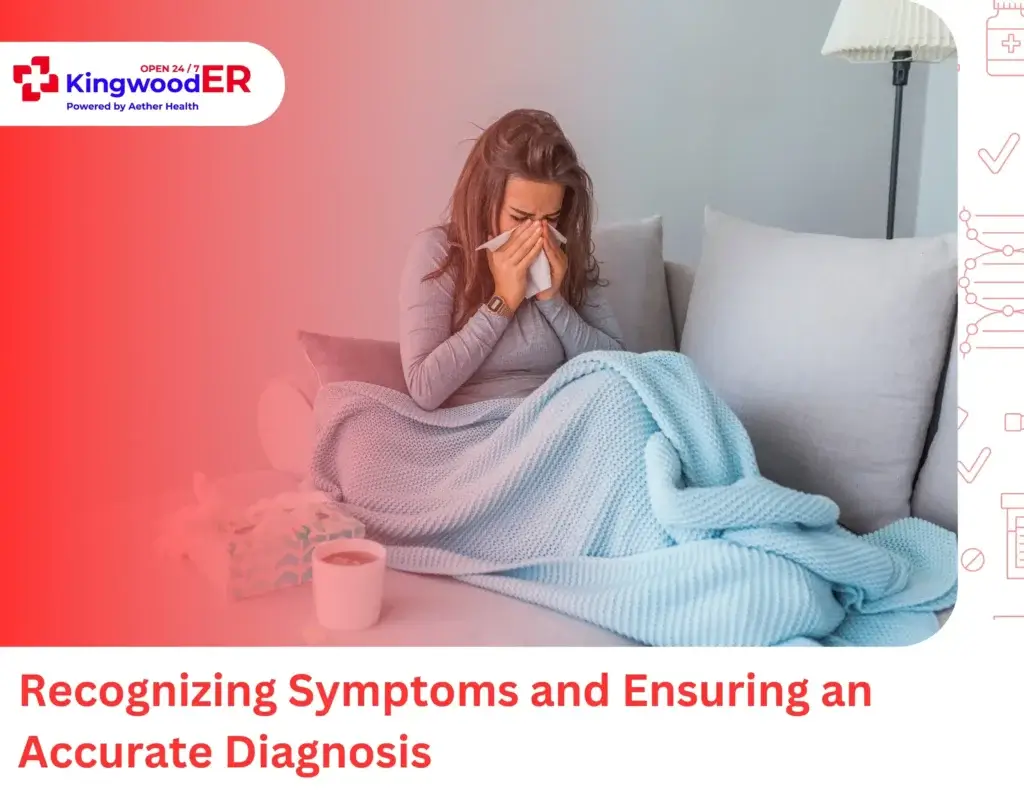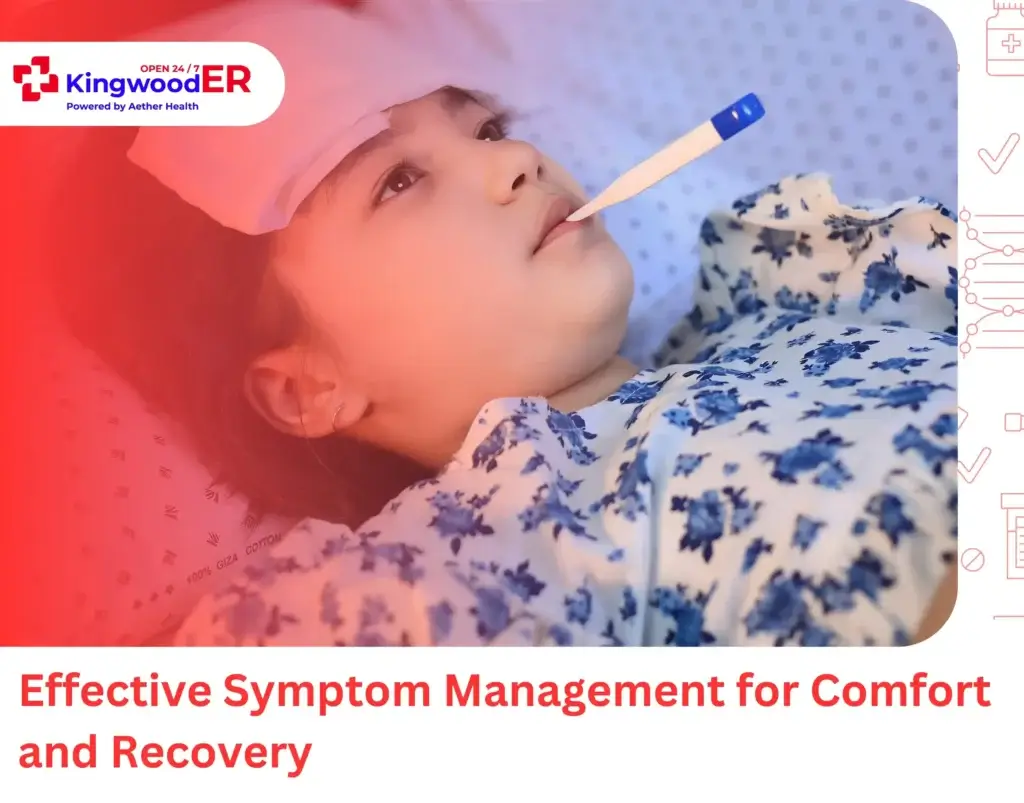When flu strikes or a fever won’t seem to go away, it’s easy to feel unsure about whether to rush to the ER or wait it out. The wrong choice can lead to serious complications, and it’s not always clear what’s urgent.
This guide will help you recognize when flu symptoms and fever signal an emergency, so you can feel confident about your next move.
Recognizing Symptoms and Ensuring an Accurate Diagnosis

Flu symptoms can range from mild to severe, with key signs often including:
- High fever and chills, frequently paired with profuse sweating as the body tries to regulate its temperature.
- Muscle aches and fatigue, contributing to a profound sense of weakness that can last for days.
- Intense headaches and a sore throat, which can become significantly painful and hinder daily activities.
- A persistent cough, which may start mild but can worsen as the infection progresses, making breathing difficult.
Comprehensive Treatment Strategies for Flu and Fever
At Kingwood Emergency Room, we adopt a comprehensive strategy for managing influenza and fever, focusing not only on immediate symptoms but also on preventing potential complications to facilitate a complete recovery
Timely Antiviral Treatment
For confirmed cases of influenza, early antiviral treatment plays a crucial role in improving recovery outcomes. When administered within 48 hours of symptom onset, these medications can:
- Shorten the Duration of Illness: By targeting the virus directly, antivirals help to speed up recovery, reducing the overall impact on daily life and minimizing time away from work or school.
- Ease Symptom Severity: Antivirals can alleviate symptoms such as fever, body aches, and fatigue, reducing the intensity of discomfort and preventing prolonged suffering.
- Reduce the Risk of Complications: Early treatment lowers the chances of serious complications like pneumonia, secondary bacterial infections, or hospitalizations, ensuring a smoother and safer recovery process.
Effective Symptom Management for Comfort and Recovery

Our team customizes supportive measures to manage symptoms based on individual patient needs:
- Pain and Fever Management: Acetaminophen or ibuprofen assist in regulating body temperature and alleviating discomfort, preventing undue strain on the body.
- Hydration Support: Increased fluid loss due to fever requires proper hydration. Patients are encouraged to maintain fluid intake, with IV hydration offered in severe situations.
- Rest and Immune Enhancement: Sufficient sleep and reduced physical activity enable the body to concentrate on combating the infection.
Enhanced Supportive Care for Severe Cases
For patients facing complications or presenting high-risk conditions, further interventions may be warranted:
- Oxygen Support: Provided when respiratory distress or low oxygen saturation impairs breathing.
- IV Fluids and Electrolyte Management: Ensuring proper hydration and maintaining electrolyte balance in patients unable to sustain fluid intake.
- Infection Control Protocols: Isolation strategies help limit the virus’s spread within the facility, safeguarding both patients and staff.
Advanced Care Options
In cases of severe medical emergencies, our emergency room is equipped to provide immediate, life-saving interventions for severe medical conditions:
- Emergency Stabilization: Our specialized team provides round-the-clock monitoring with advanced cardiac and respiratory support when needed. We track vital signs continuously and implement targeted treatments.
- Critical Care Support: For patients with breathing difficulties, we offer emergency respiratory interventions and stabilization while arranging transfer if advanced ventilation is required.
- Comprehensive Care Coordination: Our emergency physicians work closely with specialists at major medical centers, ensuring seamless transitions when patients need hospital admission for ongoing care.
For less severe cases requiring extended observation, we offer comfortable monitoring suites where we can track your recovery
Preventative Measures
Mitigating severe illness begins with proactive health interventions. Kingwood Emergency Room promotes:
- Annual Flu Vaccination: Receiving a flu vaccination not only decreases the likelihood of infection but also lessens the intensity of symptoms, lowers hospitalization rates, and safeguards vulnerable populations, including the elderly and those with chronic health conditions.
- Public Health Education: We empower our community with evidence-based information on hygiene practices, highlighting that simple actions such as handwashing, appropriate mask usage, and avoiding crowded places during outbreaks can significantly reduce transmission rates.
- Timely Intervention: Seeking prompt medical attention at the onset of symptoms such as difficulty breathing, persistent fever, or worsening fatigue enables timely treatment, minimizes complications, and helps prevent emergencies.
Why Timely Medical Intervention Matters

Seeking timely medical attention for flu and fever is essential, not only for personal recovery but also for the health of the wider community.
- Preventing Severe Complications: If left unaddressed, influenza can develop into severe complications such as pneumonia or worsen chronic conditions like asthma or heart disease, particularly among at-risk populations.
- Facilitating Recovery: Early treatment can reduce the duration of illness, lessen symptom intensity, and decrease the likelihood of secondary infections, enabling patients to return to health more swiftly.
- Mitigating Transmission: Prompt action protects not only the individual but also curtails the spread of the virus, thus minimizing outbreaks and ensuring the safety of vulnerable groups from serious illnesses.
Key Takeaway
The flu might seem routine, but when a high fever won’t break, breathing feels strained, or dehydration leaves you weak, it’s more than just a bad bug, it’s a reason to act. Don’t brush off warning signs. If your body is telling you something isn’t right, listen.
At Kingwood Emergency Room, we’re here around the clock for those moments when the flu takes a dangerous turn. From IV fluids to breathing support, our team moves fast to get you back on your feet because no one should battle severe flu symptoms alone.
FAQs
How do ERs manage fevers?
The Kingwood ER treats fever through immediate testing and vital sign monitoring. Treatment begins promptly with IV fluids, fever-reducing medications, and targeted therapies based on the underlying cause.
Can I take a hot bath with a fever?
No! We do not recommend hot baths for fever as they raise your body temperature further and can be dangerous. If your fever persists over 103°F or is accompanied by severe symptoms, seek emergency care immediately rather than trying home remedies.




